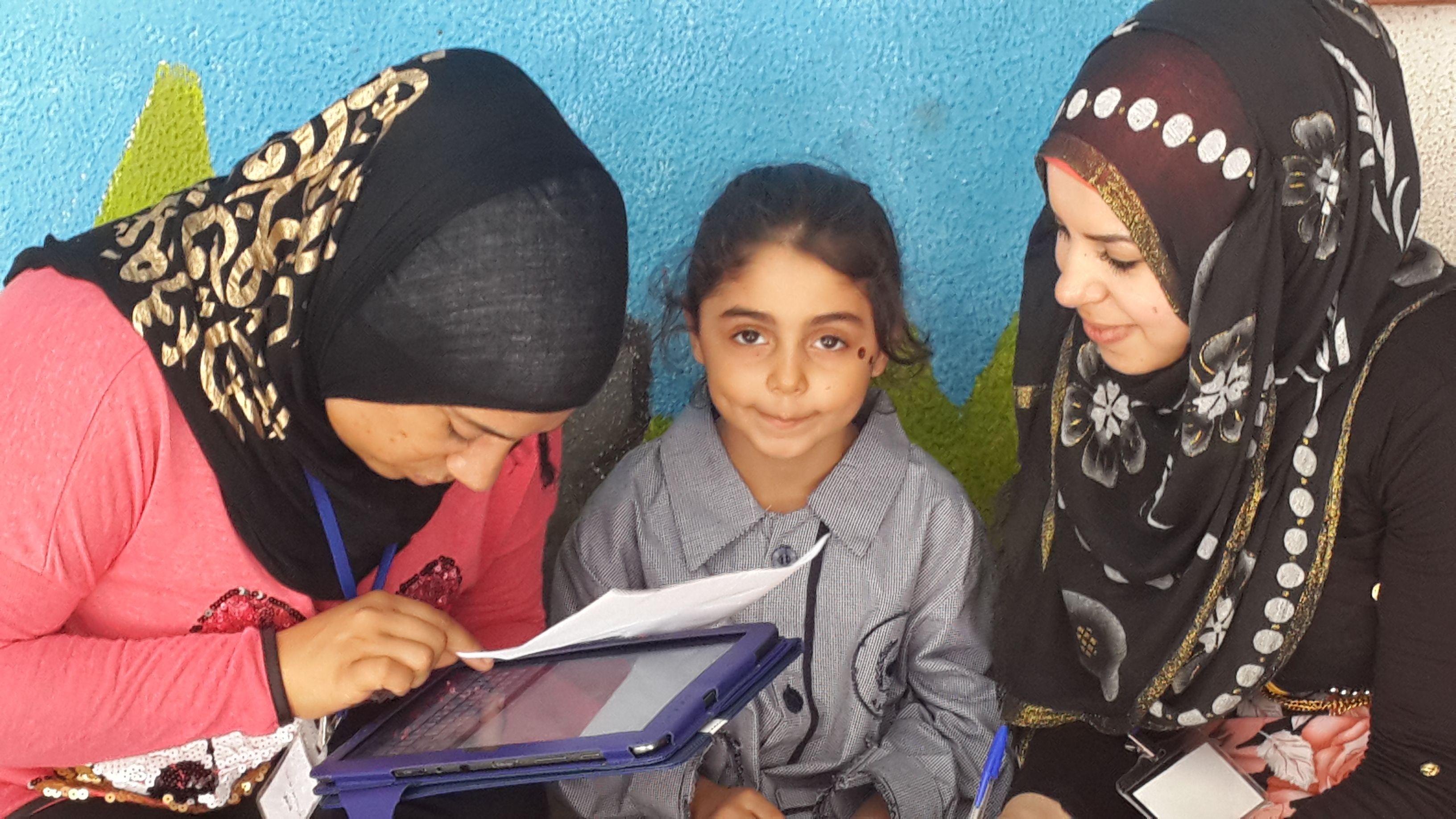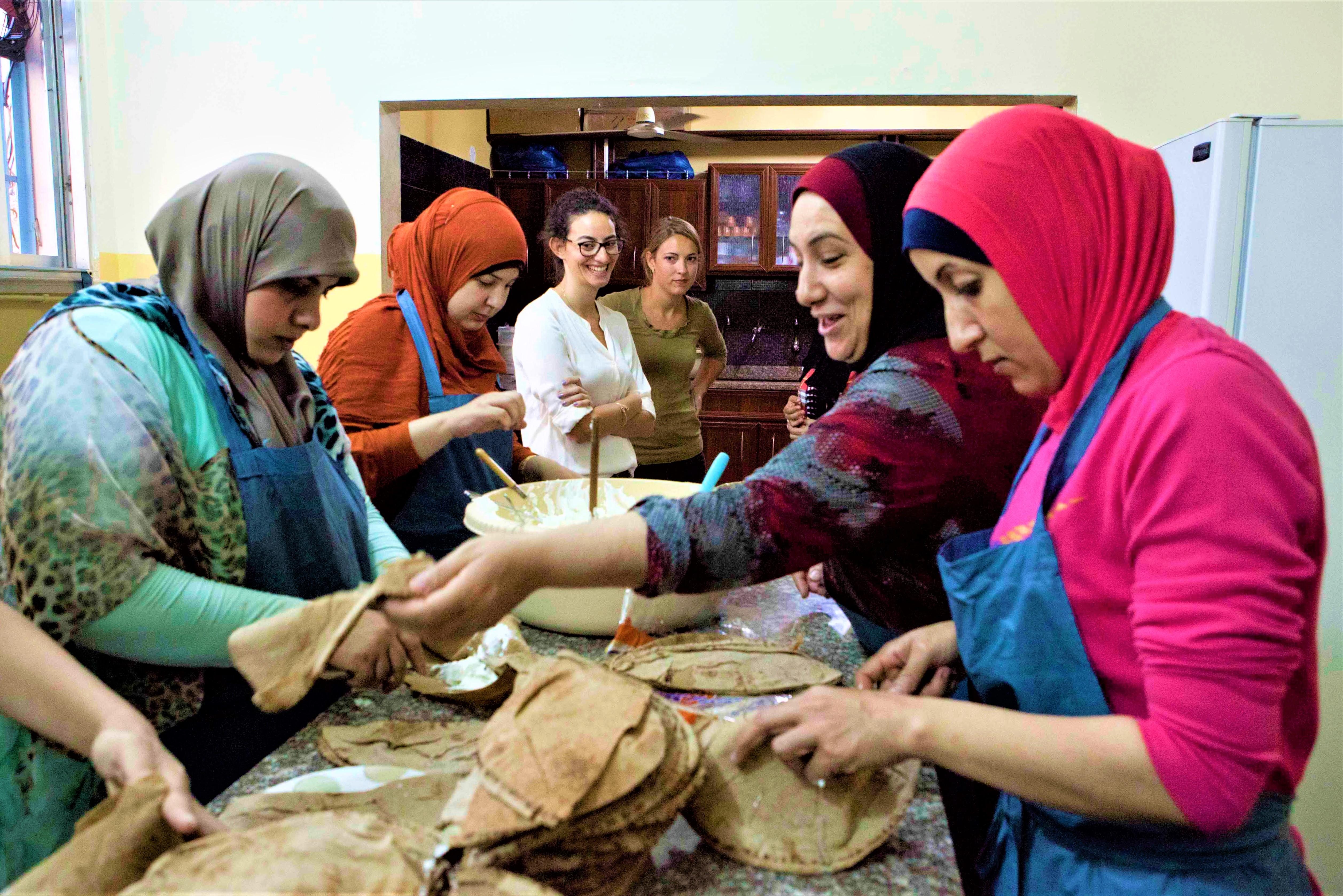The Healthy Kitchens, Healthy Children intervention in Beirut, Lebanon, provided a model for women-led entrepreneurship while distributing healthy Palestinian meals to schools
Image Credit: Healthy Kitchens, Healthy Children Intervention, UMD and AUB
The University of Maryland, in collaboration with the American University of Beirut (AUB), led an intervention in two Palestinian refugee camps in Beirut, Lebanon, with the dual goal of empowering women and improving food security. The Healthy Kitchens, Healthy Children intervention helped women set up small business kitchens to prepare healthy Palestinian meals to be distributed for a subsidized cost in local schools. Nadine Sahyoun, project lead and professor in Nutrition & Food Science at UMD, the daughter of Palestinian refugees herself, was born in Egypt and moved to Lebanon as a young woman. Applying her personal experience and expertise as a community-based nutrition researcher, Sahyoun and her colleagues at AUB were able to design this intervention to encourage children to eat healthier and less Westernized meals in schools, while also giving women additional economic and personal sovereignty through their new catering enterprise.

“It was great to be able to spend one year in Lebanon at AUB, especially working on interventions that provide some assistance to women and children in these conditions,” says Sahyoun. “Empowering these women is very important to me, and the opportunity to work with this population who left Palestine at the same time as my family is very difficult to put into words, but it was definitely a very rewarding experience.”
Funded by The Nestle Foundation for the Study of Problems of Nutrition in the World, the study focused on training women in food preparation, food safety, and entrepreneurship to establish catering kitchens in two Palestinian refugee camps, facilitating a business model to distribute the meals produced to local schools for a subsidized fee. In Lebanon, Palestinians live in urban camps without a lot of support and face restrictions on employment opportunities and social exclusion. Female participation in the workforce is as low as 17%, and almost two-thirds of the population lives in poverty. Subsequently, food insecurity is a serious concern, with fluctuations in income having a major impact on food and nutritional availability from household to household.
“I’ve worked with many refugee populations - Iraqi, Syrian, Palestinian - and seeing the turmoil that exists in these other parts of the world, it is very difficult to see,” says Sahyoun. “Our project there was a very small drop in the bucket, but it helped illuminate the extent of the problem there.”

Sahyoun and the AUB team were able to see a measurable difference from their intervention across social support, mental and social well-being, decision-making, and financial security outcomes among women working in these kitchens.
One participant in the study discussed the economic impacts of the intervention: “I started feeling that I am productive in something, even if I [just use the money to] recharge [credit] to my phone. If I get my daughter shoes, or glasses, or if I get myself a watch, I start feeling that I am doing something, something from my own effort, something that has a value.”
Another woman discussed how she felt empowered: “My personality really got stronger. Before I used to say I’m living, and my kids are what are important. Now, I want to live and to prove that I exist [and] I have my personality. Just like a man can work and be productive, a woman as well can work and be productive, and the rights should be equal between a man and a woman. Now I feel that I am a productive woman.”
An additional benefit of the intervention that Sahyoun is particularly proud of is that children in the camps who received these nutritious takes on traditional Palestinian meals were excited to eat these foods again, when they would otherwise be asking for a less healthy and more Westernized diet.
“We developed a menu for everyday meals based on traditional Palestinian food,” explains Sahyoun. “Kids in the camps are moving away from traditional eating and eating junk food like chips, but with this intervention, they were eating more Palestinian foods. They were actually going home and asking their parents to cook these traditional cultural meals again, which to me was a worthwhile unexpected outcome.”
Sahyoun continues her work not only in food security and nutrition, but also as an advocate for women in her current role as an AGNR UMD Advance Professor, a program that works to support the recruitment, retention, advancement, and professional growth of women and under-represented minority faculty at UMD.
For more information on the Healthy Kitchens, Healthy Children intervention, see Sahyoun’s recent peer-reviewed publications for this intervention on women empowerment in BMC Public Health (“A mixed-methods evaluation of community-based healthy kitchens as social enterprises for refugee women”) and food security in Public Health Nutrition (“Linking women-led community kitchens to school food programmes: lessons learned from the Healthy Kitchens, Healthy Children intervention in Palestinian refugees in Lebanon”).